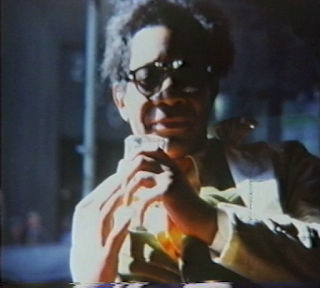Jason and Shirley (Stephen Winter, 2015)
Shirley Clarke's 1967 Portrait of Jason is not above criticism. The problems begin with the very notion that Clarke owns her portrait of Jason Holliday, a black hustler/entertainer who tells stories, rambles on, and ultimately breaks down underneath Clarke's boom mic. As with Grey Gardens, Portrait of Jason reveals the exploitative potential of cinéma vérité as the fly-on-the-wall camera appropriates a life wholesale for someone else's benefit. But vérité's unwavering regard cannot bleed all agency from the subjects before it (which holds for Grey Gardens as well) and thus the question of exploitation becomes much more complex. Jason and Shirley fails to see that complexity and results in 70 minutes of weak film criticism.
A docudrama imagining the circumstances surrounding the creation of Portrait of Jason, Jason and Shirley casts Shirley Clarke (Sarah Schulman) as the villain of the piece. She frets between takes that Jason's (Jack Waters) unruffled demeanor and constant laughter isn't giving her the vérité. So she enlists Jason's close friend, actor Carl Lee (Orran Farmer), to bait Jason and reduce him to tears which itself is revealed in a "gotcha" last shot to be just another act on Jason's part. As Winter and Waters made clear in a Q&A at MOMA last week, their Jason says "no" to Shirley Jason and has more agency in organizing his representation. In short, Jason and Shirley is on a truth-telling mission to correct the shortcomings of Portrait of Jason.
But it's naive to assume that Clarke viewed the majority of her footage as a vérité failure. The ultimate truth Portrait of Jason attests to is the often disingenuous facework we all perform in confrontation/collaboration with the public sphere whether walking down the street and holding forth in front of a camera. Furthermore, several of Holliday's monologues are a form of no-telling, especially in his accounts of working as a maid for various rich white women. Even if we are to assume that Portrait of Jason is pure exploitation, the very fact that a black man breaks the fourth wall and talks at you for close to two hours offers a rare cinematic experience, one that complicates any charge of exploitation. There are no shot-reverse shots or eyeline matches in Portrait of Jason. But Jason and Shirley features plenty of them. So now Jason is sutured into a narrative space triangulated by a homophobic cameraman, a nervous twink doing sound, and an ever-scheming Shirley, all white. And then halfway through, black characters arrive to get Jason high or make him cry. By attaching Jason Holliday so absolutely to that historic day (apart from some awkward attempts to ventilate the story with brief vignettes from Holliday's past), Jason and Shirley winds up reproducing the perceived inequities of Portrait of Jason (a fate avoided by the HBO augmentation of Grey Gardens).
A docudrama imagining the circumstances surrounding the creation of Portrait of Jason, Jason and Shirley casts Shirley Clarke (Sarah Schulman) as the villain of the piece. She frets between takes that Jason's (Jack Waters) unruffled demeanor and constant laughter isn't giving her the vérité. So she enlists Jason's close friend, actor Carl Lee (Orran Farmer), to bait Jason and reduce him to tears which itself is revealed in a "gotcha" last shot to be just another act on Jason's part. As Winter and Waters made clear in a Q&A at MOMA last week, their Jason says "no" to Shirley Jason and has more agency in organizing his representation. In short, Jason and Shirley is on a truth-telling mission to correct the shortcomings of Portrait of Jason.
But it's naive to assume that Clarke viewed the majority of her footage as a vérité failure. The ultimate truth Portrait of Jason attests to is the often disingenuous facework we all perform in confrontation/collaboration with the public sphere whether walking down the street and holding forth in front of a camera. Furthermore, several of Holliday's monologues are a form of no-telling, especially in his accounts of working as a maid for various rich white women. Even if we are to assume that Portrait of Jason is pure exploitation, the very fact that a black man breaks the fourth wall and talks at you for close to two hours offers a rare cinematic experience, one that complicates any charge of exploitation. There are no shot-reverse shots or eyeline matches in Portrait of Jason. But Jason and Shirley features plenty of them. So now Jason is sutured into a narrative space triangulated by a homophobic cameraman, a nervous twink doing sound, and an ever-scheming Shirley, all white. And then halfway through, black characters arrive to get Jason high or make him cry. By attaching Jason Holliday so absolutely to that historic day (apart from some awkward attempts to ventilate the story with brief vignettes from Holliday's past), Jason and Shirley winds up reproducing the perceived inequities of Portrait of Jason (a fate avoided by the HBO augmentation of Grey Gardens).



0 Comments:
Post a Comment
<< Home